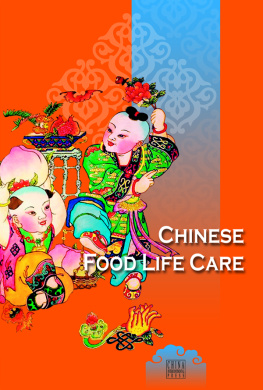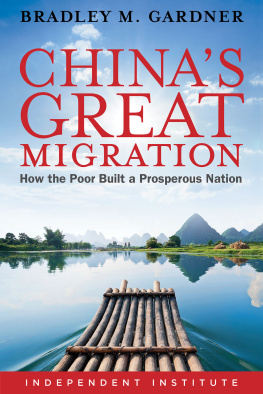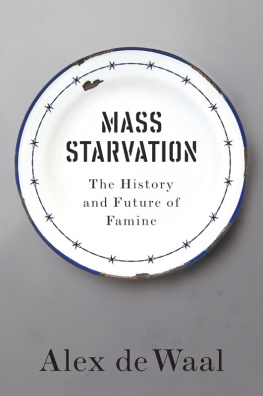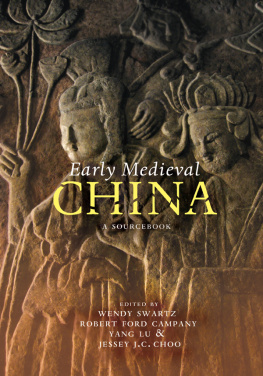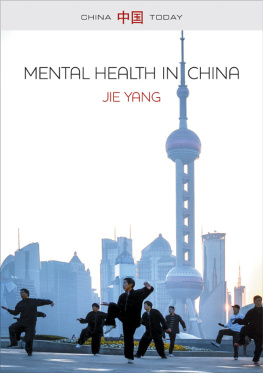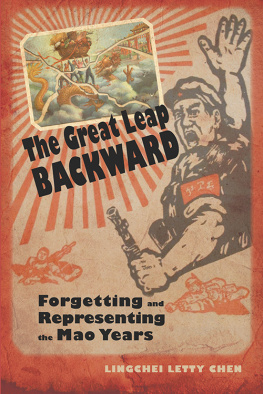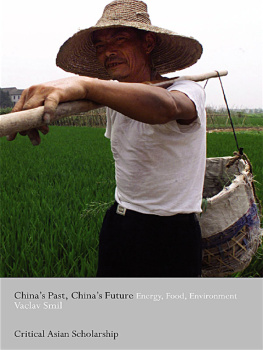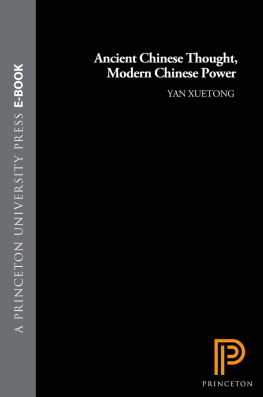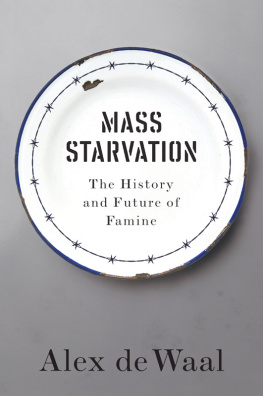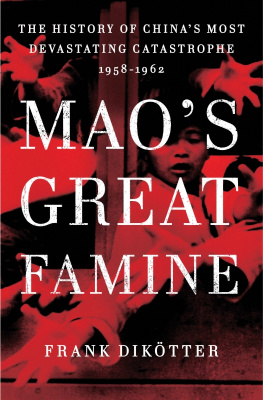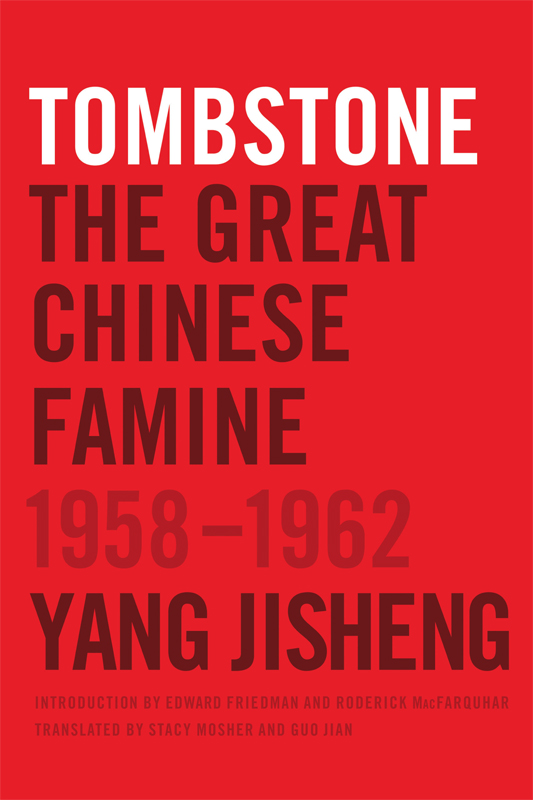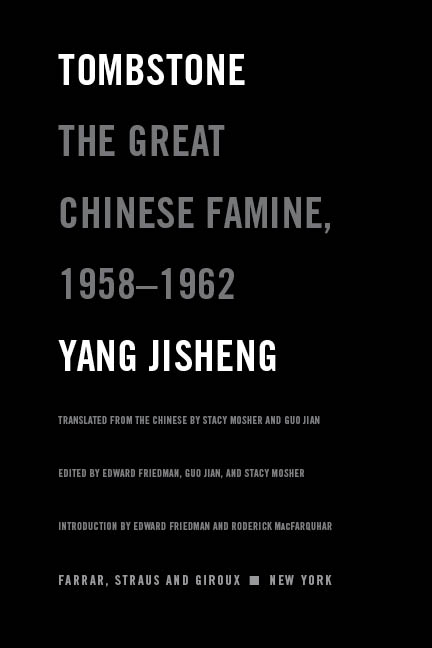
The author and publisher have provided this e-book to you for your personal use only. You may not make this e-book publicly available in any way. Copyright infringement is against the law. If you believe the copy of this e-book you are reading infringes on the authors copyright, please notify the publisher at: us.macmillanusa.com/piracy.
CONTENTS
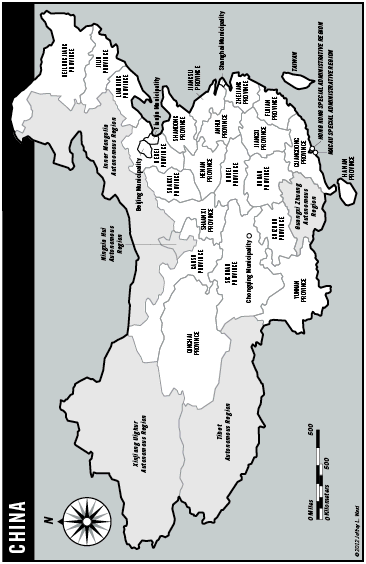
INTRODUCTION
by EDWARD FRIEDMAN and RODERICK M AC FARQUHAR
Tombstone describes and analyzes the worst famine in human history, the disaster inflicted upon the Chinese people between 1958 and 1962. Author Yang Jisheng, a distinguished journalist by profession and an inspired investigator by avocation, wrote this book in part to expiate his shame for watching his father die of starvation in 1959 and not understanding the cause. At the time, Yang was loyally supporting the policies of the Great Leap Forward. Only thirty years later did he accept that the state system and Chinese Communist Party (CCP) policies were the direct cause of his fathers death.
This book is about the murderous impact of the Great Leap policies and the CCP leaders who conceived them. Yang shows that the supreme leader, Mao Zedong, soon knew that his economically irrational policies were deadly. But Mao protected his power by reaffirming them against the few brave colleagues who questioned them. Had Mao continued to heed those criticisms, which he did briefly, the death toll would have been massively reduced.
Tombstone is about a hierarchical authoritarian system of concentrated power in which every official is, as Yang puts it, a slave facing upward and a dictator facing downward. At the bottom of the system were the Chinese people, mostly farm households, who suffered under the murderous brutality of the lower-level officials, proving an iron law of bureaucracy: the pettier the bureaucrat, the harsher his rule.
During the Great Leap Forward and its aftermath, CCP system harshness became murderousness: an incalculable number of Chinese chose to kill other Chinese. There were exceptions to that rule in famine-struck China, and Yang gives them their heroic due. For those officials, however, trying to save lives usually brought the end of their careers, often the loss of their freedom, and even the end of their lives.
Most of this book depicts the fate of the tens of millions of people like Yangs father who died during the famine. Yangs estimate is at least 36 million, somewhere between the 28 to 30 million estimated early on by demographers, the 42 to 43 million arrived at by an official fact-finding mission in the early 1980s, and the 45 million plus in one recent scholarly analysis.
All the estimates of the innocent dead are mind-boggling. It is the strength of Yangs investigation that makes the statistics come alive as people confront death by a system and its policies. He also exposes horrific survival choices: to keep one child alive by starving the others; to eat a recently dead relative or even to dig up a corpse from a grave; to desert ones family and flee to another province knowing this could lead the local CCP to kill ones family members; to protect oneself by informing on ones neighbors; to sell oneself to an official for a few scraps from his table (because, for officialdom, there was always plenty to eat). Yang helps us feel the anguish of immoral options.
What is extraordinary about the famine figures is not just their size but that, whichever figure is correct, this system, its leader, and his policies killed even more Chinese than did the brutal Imperial Japanese Army during the Sino-Japanese War of 193745. This is not an easy fact for patriotic Chinese to swallow.
The pathbreaking work of Nobel Prizewinning economist Amartya Sen has shown that famines are not necessarily the result of lack of food. But the argument that lack of information about shortages is often a cause does not apply in this case. While junior officials did falsify data to benefit their own careers, Mao had enough reports from senior colleagues to know that his policy of extracting an increasing percentage of grain from the countryside was causing millions of deaths. The lives of Chinese villagers in the tens of millions were sacrificed in the interest of other policy objectives, including Maos own retention of power.
Yangs history builds on solid recent Chinese scholarship that has been published in China. Tombstone , however, is banned in China, perhaps because Yangs material makes clear the culpability of the Chairman, his colleagues, his party, and their system that caused tens of millions of deaths. Perhaps also the authorities were appalled at the extent of Yangs vivid documentation of the killing. This was not just one mans history. Yang got people who experienced the famine to describe it in their own words. He found local journalists whod witnessed and reported on murders and starvation and got them to write their memoirs. He located and interviewed local implementers of the fatal policies. He got surviving resisters to recount their experiences.
Using his privileged status as a high-ranking journalist, Yang culled dozens of archives throughout the country that contained contemporary secret party reports of the impact of the famine and the summary manner in which officials had ordered the killing of resisters. This English version highlights the voices that Yang alone sought out and captured so that the murderous impact of the Great Leap Forward could be experienced in the words and feelings of the survivors.
Yangs two-volume masterpiece was originally published in 2008 in Hong Kong, running to 1,200 pages in Chinese and reprinted eight times in two years. The highly qualified Stacy Mosher translated the whole work. Guo Jian, wonderfully comfortable in the argot of both Chinese and American cultures, then polished the translation. Finally, Edward Friedman, a specialist on the politics of rural China, assisted the translators in condensing and editing the manuscript. Yang invited Friedman and Harvards specialist on Chinese elite politics, Roderick MacFarquhar, to write this preface to introduce the book to an English-reading audience.
TRANSLATORS NOTE
As translators, we faced two major and interrelated challenges: the length of Yang Jishengs monumental work and the ordering of its chapters.
The original Chinese version of Tombstone totaled more than 800,000 Chinese characters and was published in two volumes totaling more than 1,200 pages. Recognizing that in todays media environment no one would publish a translated work of that length, Mr. Yang reduced the Chinese version to something over 500,000 characters. We initially translated this version, but were advised that it was still an impractical length. With the assistance of our colleague Edward Friedman, and with Mr. Yangs permission, we edited the book down to the version presented here. Our primary goal was to preserve the essence of Mr. Yangs work in all respectsa representative sampling of his comprehensive coverage and the bulk of his analysis and reflections on this epic tragedy. We hope weve produced an edition of Tombstone that is accessible to a general reader while also enlightening to scholars and specialists.
In the initial process of reducing the length of Tombstone , Mr. Yang proposed reordering the chapters for a non-Chinese audience. In the original two-volume work, the first volume is largely microscopic, examining the calamity as it affected individual provinces all the way down to the grassroots level, while the second volume, macroscopic in design, covers the nationwide agricultural collectivization movement and analyzes the political system that was ultimately responsible for the disaster. Since the early chapters in the second volume could serve as an introduction to the overall situation of the famine, Mr. Yang considered starting the book with these chapters to better prepare Western readers for the provincial chapters.


